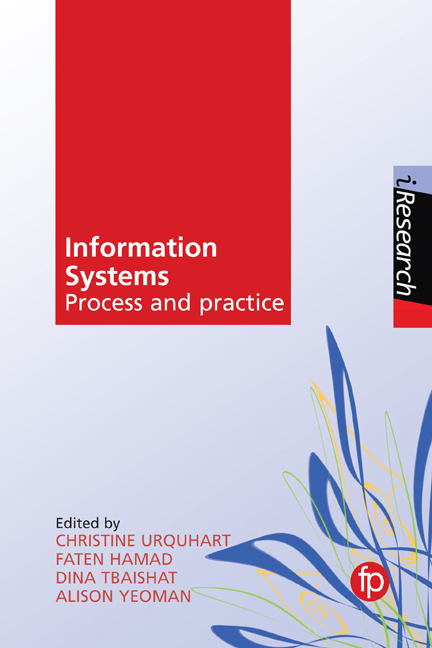Book contents
- Frontmatter
- Contents
- List of tables and figures
- Series editor's foreword
- About the authors
- 1 Introduction
- 2 Approaches to information architecture
- 3 Taxonomy testing for information architecture
- 4 The enterprise website and its information structures
- 5 Analysing activities, roles and processes
- 6 Libraries and the organisation of library processes – a history of operational research, and the use of process modelling
- 7 Using Riva process modelling to study book acquisition in academic libraries
- 8 Workflow analysis and process mapping in US academic libraries
- 9 A theoretical framework for designing and evaluating semi-structured document triage interfaces
- 10 Resource discovery case studies
- 11 Increasing social connection through a community-of-practice-inspired design
- 12 Methods for studying information provision, networking and communication in patient support groups
- 13 Health information systems: clinical data capture and document architecture
- 14 Producing systematic reviews and getting evidence to the clinician
- Index
6 - Libraries and the organisation of library processes – a history of operational research, and the use of process modelling
Published online by Cambridge University Press: 08 June 2018
- Frontmatter
- Contents
- List of tables and figures
- Series editor's foreword
- About the authors
- 1 Introduction
- 2 Approaches to information architecture
- 3 Taxonomy testing for information architecture
- 4 The enterprise website and its information structures
- 5 Analysing activities, roles and processes
- 6 Libraries and the organisation of library processes – a history of operational research, and the use of process modelling
- 7 Using Riva process modelling to study book acquisition in academic libraries
- 8 Workflow analysis and process mapping in US academic libraries
- 9 A theoretical framework for designing and evaluating semi-structured document triage interfaces
- 10 Resource discovery case studies
- 11 Increasing social connection through a community-of-practice-inspired design
- 12 Methods for studying information provision, networking and communication in patient support groups
- 13 Health information systems: clinical data capture and document architecture
- 14 Producing systematic reviews and getting evidence to the clinician
- Index
Summary
COMMENTARY: CHRISTINE URQUHART
Chapter 6 examines the history of operations research within libraries, and some of the more recent changes to academic libraries, the new roles required for staff, and the challenges to provide services that meet needs, within budgetary constraints. The chapter concludes with an overview of some examples of the use of business process modelling techniques. Strategic planning is mentioned frequently in the library literature but mostly in aspirational terms – urging staff (presumably) onwards for the greater good of the library and its users. It is more common to read about the challenges of new roles – but what happens to the old roles? Pritchard (2013) points out that libraries need a strategic approach to training that goes beyond individual development needs, but looks at organisational needs at several levels. She suggests that libraries identify which skills and competencies are required by all staff, which are required somewhere, and which could be obtained from external resources. Some skills will be required to advance strategic library goals, others for operational purposes. Ideally such attention to skills and role redevelopment should link to the institutional goals.
Chapter 5 discussed how a process architecture could be developed that might help libraries assess their fit within an organisation, but it is unclear from the literature how many libraries do more than pay lip service to the principles of serving the mission of the organisation. Franklin (2012), for example, suggests that academic libraries should shift from divisions of activities based on traditional library functions to structures that reflect organisational goals (undergraduate education, research, outreach etc.). This might be bewildering to many staff if there was total upheaval, and a likely mid-road compromise might be some relabelling, but the same functions would continue as before. As Chapter 5 emphasises, business process analysis requires commitment and time to succeed. The suspicion that most library staff do not feel they have the time or the energy for anything other than tinkering at the edges might be confirmed by the survey of library mission statements compared with institutional mission statements, where a discourse analysis found very weak links between the sets of statements (Wadas, 2017). On the other hand, in practice, when library staff are confronted with users with needs, they may well get on with the job as best they can at the operational level.
- Type
- Chapter
- Information
- Information SystemsProcess and Practice, pp. 85 - 106Publisher: FacetPrint publication year: 2017



